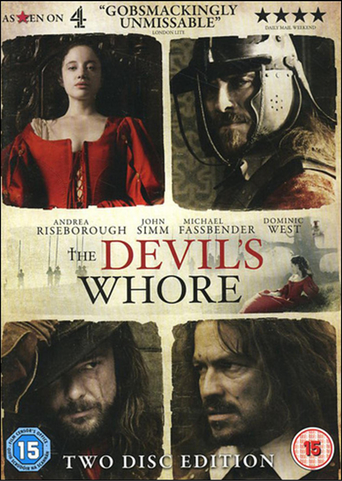

The Devil's Whore (2008)
Set between the years 1642 and 1660, "The Devil's Whore" charts the progress of the English Civil War through the eyes of the a 17 year old girl, the fictional Angelica Fanshawe.
Watch Trailer
Cast
Reviews
Exactly the movie you think it is, but not the movie you want it to be.
Exactly the movie you think it is, but not the movie you want it to be.
Through painfully honest and emotional moments, the movie becomes irresistibly relatable
The movie really just wants to entertain people.
Fine acting, good production values and a butt-stupid script characterize this series, which follows the same hoary old formula as any number of women's fictions from the past hundred years or so, notably "Gone With The Wind" and "Forever Amber." The beautiful, free-spirited, lusty heroine plunges recklessly from adventure to adventure and man to man, running smack into famous historical characters at every turn. Please note that the title at the beginning of each episode claiming that this is a true story is a lie. There was never any such person as Angelica Fanshawe, though there actually was a guy named Edward Sexby. It's too bad no one had the idea of eliminating the character of Angelica altogether and just making the series "Sexby" instead.Capaldi doesn't have a whole lot of screen time as Charles I and nothing approaching a coherent character to play, but he pulls it all together nevertheless and creates a memorable figure of quiet authority not that unlike his Cardinal Richelieu in "The Musketeers." His performance makes the execution scene absolutely riveting, despite the thoroughly stupid decision to intercut it with the execution of the fictional Angelica, who's hanged but gets better after Sexby gives her CPR. Did I actually give this thing a 6? I went and changed it to a 5. 5 for Capaldi and others like Andrea Riseborough, John Simm and Dominic West who gave their considerable talents to making this silly spleeb.
The true story of Angelica Fanshawe, they say it is, but that is secondary to the real interest of this mini-series. Born close to the royal court of Charles I, married within that closed sanctuary, closed especially to what other people may think, and particularly repressive with all those that represented some kind of danger for the crown, she was confronted with a time when truth was the master word of everyone, love the premium of every one and yet the everyday reality was sectarianism and violence directed at all those who differed from you, no matter where you stood.Her story could be reduced to a series of husbands or to a series of man friends or to a series of failures with a successful birth at the end. That's what makes this film striking if not shocking at times with the extreme confrontation of the audience to excessive violence and all other types of executions, corporeal punishments, absolute deprivation of everything, victimization and injustice. And there is not one camp in this full array of differences that is better than the others.But I think this film goes a long way beyond these details and gritty small impressive elements. First of all it is rather clear on the "constitutional debate". The king is of divine nature and has no reason to share his power which is divine and absolute. Parliament, not clearly identified as the representative of the upcoming merchant bourgeoisie whose power was founded on the possession of the merchant fleet, of practically all ships in England, and the control over all sailors, is unable to get out of its small petty meaningless, except for them of course, effete and useless debate on some obtuse religious questions like predestination and the Eucharist, holy sacraments and contact with god, and eventually the right of the people (what people when parliament was elected by a few tens of thousands of propertied people?) to dismiss the king if his connection with the people (what people again.) got discontinued. They were no longer in touch, if they had ever been, with the needs and desires of simple people.The film insists in fact a lot on the Levelers, those people who defended the idea that the land was the property of those who tilled it and that everyone was supposed to share equally with everyone else. They were hunted by the king's men because they were seen as the most dangerous anti-royal enemies since they wanted the end of monarchy and the shift to an equalitarian republic. On the other side they were equally hunted by Cromwell's supporters because Cromwell was not for a republic, was a direct representative of the mercantile bourgeoisie and was against equal sharing, and yet at the same time he was not for a republic and believed deep in himself this country could only be one-handedly governed by a single man, which he resigned to do himself when no compromise could be found with the king.The film is absolutely silent, alas, on the various wars in their details: the two civil wars, and then the Irish war and then the Scottish war and then the war with Spain. The first two were against the king and ended with his bodily shortening. The next one was a bloody massacre based on the idea that Catholics had fallen down to lower than animals since they were able to let their own children starve, if not help them a little bit. The Scottish episode is not represented and the Spanish caper is not even mentioned because it confirmed a radical change that had started under Elizabeth I when she had to mobilize the country against Spain. In both cases the Parliament was the key to that demand because the owners of the ships and the employers of the sailors were all directly in parliament or represented in and by parliament. So Elizabeth gave some powers to parliament over taxation for example, in order to get what she wanted: ships and sailors. Cromwell went even further. He had to summon and convene a parliament he had violently disbanded.Why forget these events that are just coming to the beginning of the end in Ireland, that was solved in Scotland with devolution, and that is the basis of the tremendous move England was able to initiate in the Christian world towards a democratic parliamentary elective system that will take fifty years after the Glorious Revolution (1660) to establish fundamental human rights like Habeas Corpus, the freedom of the press and of publication. That's a shortcoming of great size in the film but that does not prevent us from feeling the happy ending of the Commonwealth in the Glorious Revolution that was to bring a new batch of difficulties and this time the peaceful revocation of the king by parliament in a law that will establish the first constitutional monarchy in the world, a real first step towards the American Revolution and then the French Revolution.After this period no one could say like Charles I: "Give me one instance of a king being dismissed by a parliament!" Charles I was the first in 1649. James II will be the second in 1688. That's really the end of feudalism and its theory of absolute kings by divine appointment.But nevertheless the show is beautifully filmed and grandiosely performed.Dr Jacques COULARDEAU
Well, I had high hopes for this mini series from across the Atlantic, and some of those expectations were met, but, as I should have expected, others were dashed.The production values are of high caliber. Costumes, sets and locations, particularly for a British mini series, are all exceptional. There's very little in the way of criticism when it comes to poking at the amount of money and care that went into the recreation of late renaissance Britain. Truly, a first rate production where all imagery is concerned.So where does this small collection of films fall flat? This is going to sound sexist, but it truly isn't, it's a comment aimed at the continued market trend for television; the series was aimed specifically at a female audience with only the superficiality of placating to masculine interests. Every male in this series of films is portrayed as boorish on some level. From Royalists to Parliamentarians, and shades of gray in-between, few of these men have a spine.Additionally, they're all sex starved. They either are biding their time for sexual favors, or are so wanton as to be willing to force themselves on he fairer sex. They seem to have little else on their minds. And when they are granted female accompaniment, they then squander their "victory" in some sort of stupidity.That's not really a comment on what I think of society as I think of what TV producers think their audiences want to see. Again, as I've written in other reviews, the TV producer thinking is that since women buy things for the home, it is therefore that audience that the shows must cater to. "The Devil's Whore" is no different. The concepts and ideals for which both sides of the English Civil War fought are hardly ever mentioned. It seems to be the assumption that said notions have no place within the female psyche, and therefore are not worth exposition. Female concerns are for family, friends and young ones.So what does one do? The man who watches this can do little but shake his head, and maybe say "Huh, the 60's film with Richard Harris was a bit more entertaining..." Which, in my view, it was.But the film with Harris had the benefit of being a high budget major theatrical film. It wasn't some one off made for TV mini series that had to compete with "Dancing with the Stars" or other sub-IQ fodder that masks for entertainment.You may say, "Mister Blueghost, what were you expecting?" Look, I knew this was going to be a TV miniseries about a woman during the English Civil War, but I expected the Powers-that-Be in the UK to do their usual bucking of American market research, and make a film for both sexes and most ages. Something intelligent. Something with a little more purposeful action than the banal placation presented in this film's battle-sequences.In short, it was a pleasure to see something not made by and for American house-wives and professional women, but it was equally disappointing to see something made for British house-wives and professional women.*sigh*Well, maybe I'll whip out my copy of Cromwell tonight, and grin as I see Richard Harris give a high energy performance in his Irish-thesping style of portraying a historic figure who didn't like the Irish a great deal.Well, I think I've learned my lesson about splurging on a UK TV series of which I know nothing.Watch at your risk.
I wasn't much of a fan of the English Civil War during History lessons at school. It was always difficult trying to decide which side to support. The glamorous, party loving Cavaliers or the serious, democratically minded, fair but boring round-heads....Watching The Devil's Whore I found my self switching sides again. However, kudos to Peter Flannery for making this period of history really interesting. This difficult period has never really been covered in movies or TV.The whole cast is absolutely amazing. Peter Capaldi is great as a doomed king, Michael Fassbender is intense and stunning as Rainsborough but my favourites are John Simm and Andrea Riseborough. Both act their socks off and make me want to keep watching. The chemistry, sparring and respect between Sexby and Angelica is fascinating! Almost perfect...


